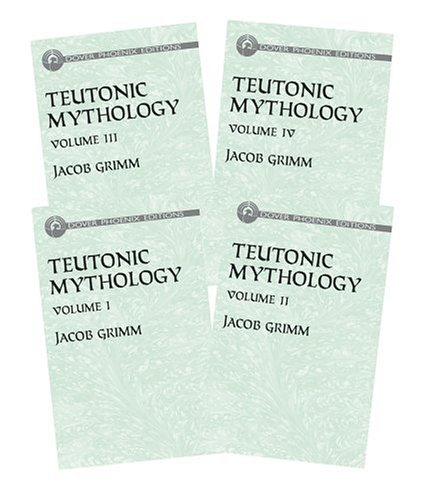Review of 'Teutonic Mythology, 4 VolumeSet (Phoenix Edition)' on 'Goodreads'
4 stars
Teutonic mythology is a bit of a misnomer as it's really about the spread of German mythology. Grimm (yes, the same one that collected all those folk tales with his brother that we now know as "Grimm's Fairy tales") painstakingly reconstructs the spread of pre-Christian religion throughout Europe via linguistic analysis and comparative study of folklore and religious writing throughout Scandinavia, the UK, Eastern Europe, the Low countries, and Germany. He makes an effective argument that what most people think of as "Norse myths" were basically the pre-Christian religion in Germany, but that in more outlying regions of Europe that converted later the old Gods survived long enough to make it into writing. Be forewarned, this is not a quaint collection of tales of giants versus heroes and whatnot, it is the comparison of every_single_item of this religion in every language he can find it in. Vast passages are entirely …
Teutonic mythology is a bit of a misnomer as it's really about the spread of German mythology. Grimm (yes, the same one that collected all those folk tales with his brother that we now know as "Grimm's Fairy tales") painstakingly reconstructs the spread of pre-Christian religion throughout Europe via linguistic analysis and comparative study of folklore and religious writing throughout Scandinavia, the UK, Eastern Europe, the Low countries, and Germany. He makes an effective argument that what most people think of as "Norse myths" were basically the pre-Christian religion in Germany, but that in more outlying regions of Europe that converted later the old Gods survived long enough to make it into writing. Be forewarned, this is not a quaint collection of tales of giants versus heroes and whatnot, it is the comparison of every_single_item of this religion in every language he can find it in. Vast passages are entirely in Old German, Latin, Middle Dutch, etc. It is not a light read, and unless you are a professional linguist specializing in Germanic languages with a good handle on Latin, a lot of it will be meaningless to you. Still, a fascinating read overall. You will learn all about how Christmas trees are tokens of what used to be blood sacrifice altars. You will find out how it came to be that all of the English days of the week are named after the old Gods, while this is not the case in German. How many superstitions like knocking on wood or hanging horseshoes for luck are remnants of the old religions.It's worth it, but not to be undertaken lightly.

